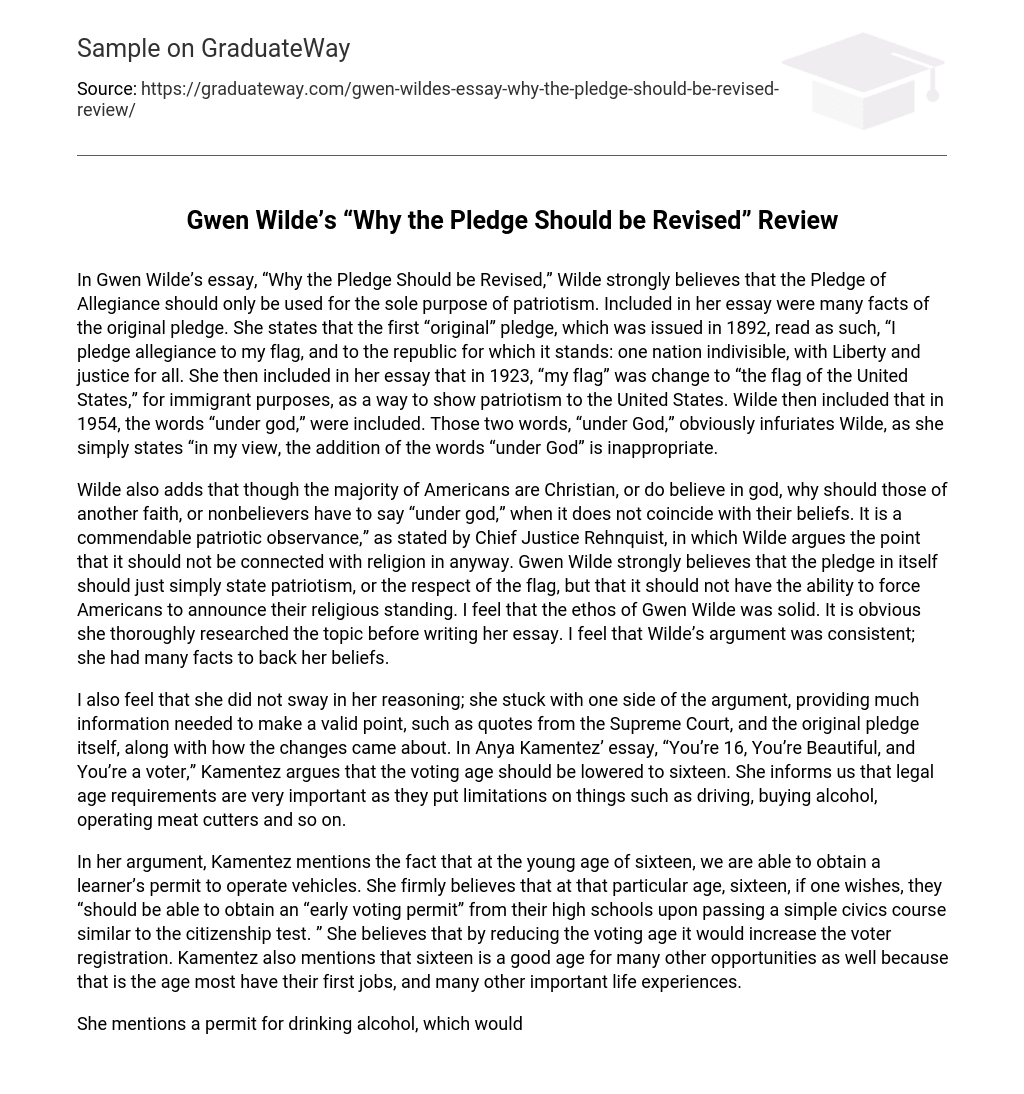In Gwen Wilde’s essay, “Why the Pledge Should be Revised,” Wilde strongly believes that the Pledge of Allegiance should only be used for the sole purpose of patriotism. Included in her essay were many facts of the original pledge. She states that the first “original” pledge, which was issued in 1892, read as such, “I pledge allegiance to my flag, and to the republic for which it stands: one nation indivisible, with Liberty and justice for all. She then included in her essay that in 1923, “my flag” was change to “the flag of the United States,” for immigrant purposes, as a way to show patriotism to the United States. Wilde then included that in 1954, the words “under god,” were included. Those two words, “under God,” obviously infuriates Wilde, as she simply states “in my view, the addition of the words “under God” is inappropriate.
Wilde also adds that though the majority of Americans are Christian, or do believe in god, why should those of another faith, or nonbelievers have to say “under god,” when it does not coincide with their beliefs. It is a commendable patriotic observance,” as stated by Chief Justice Rehnquist, in which Wilde argues the point that it should not be connected with religion in anyway. Gwen Wilde strongly believes that the pledge in itself should just simply state patriotism, or the respect of the flag, but that it should not have the ability to force Americans to announce their religious standing. I feel that the ethos of Gwen Wilde was solid. It is obvious she thoroughly researched the topic before writing her essay. I feel that Wilde’s argument was consistent; she had many facts to back her beliefs.
I also feel that she did not sway in her reasoning; she stuck with one side of the argument, providing much information needed to make a valid point, such as quotes from the Supreme Court, and the original pledge itself, along with how the changes came about. In Anya Kamentez’ essay, “You’re 16, You’re Beautiful, and You’re a voter,” Kamentez argues that the voting age should be lowered to sixteen. She informs us that legal age requirements are very important as they put limitations on things such as driving, buying alcohol, operating meat cutters and so on.
In her argument, Kamentez mentions the fact that at the young age of sixteen, we are able to obtain a learner’s permit to operate vehicles. She firmly believes that at that particular age, sixteen, if one wishes, they “should be able to obtain an “early voting permit” from their high schools upon passing a simple civics course similar to the citizenship test. ” She believes that by reducing the voting age it would increase the voter registration. Kamentez also mentions that sixteen is a good age for many other opportunities as well because that is the age most have their first jobs, and many other important life experiences.
She mentions a permit for drinking alcohol, which would allow drinking at school functions and family gatherings only, with the knowledge of alcoholism after taking a specific course. She also mentions that upon passing a financial literary test, one could obtain a credit card at sixteen, with a parental co-sign and various other restrictions of course. The main point of Kamentez’ argument is that if teens are treated more like adults, they will be more likely to act like adults and “rise to our expectations. I think that the ethos of Kamentez’ essay was kind of all over the place. She went from talking about voting to drinking alcohol and obtaining a credit card. I personally see no connection between the three. I also feel that she did not really provide any logic in her essay. Where were the facts? There was no numbers in which to compare her ideas to; whether or not lowering the age to vote, drink, and have a credit card would in fact allow teens to “rise to our expectations. ”





